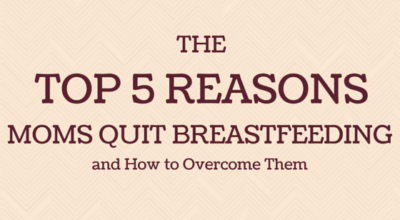The Top Five Reasons Moms Quit Breastfeeding and How to Overcome Them
According to the Centers for Disease Control (CDC), 79% of new mothers breastfed their newborns. While this number is on the rise, the amount of time mothers continue to breastfeed is shorter than recommended. Here are the top five reasons many mothers quit breastfeeding and how to overcome them.
- Pain while Nursing
 A common concern among new mothers is pain felt during or after nursing. If pain is experienced, it is typically due to the baby not latching on properly. Proper positioning is the cornerstone of successful breastfeeding and is the foundation of a good latch, especially during the early weeks.
A common concern among new mothers is pain felt during or after nursing. If pain is experienced, it is typically due to the baby not latching on properly. Proper positioning is the cornerstone of successful breastfeeding and is the foundation of a good latch, especially during the early weeks.
When properly latched, minor discomfort may be experienced for about a minute after starting as the baby initially pulls in the nipple and areola. If pain is felt longer than this length of time, try repositioning the baby on your breast. A breastfeeding support pillow can help get the baby in the proper position. Signs of a good latch are:
- Baby’s lips are flanged (think fish lips)
- Baby’s nose is nearly touching the breast
- Baby’s mouth should cover as much of the areola as possible while nursing
If you still are having trouble with pain or attaining a good latch while nursing, don’t give up. Contact a lactation consultant as soon as possible.
- Separation Following Delivery
Hospital deliveries that require the mother and baby to be separated can contribute to lactation failure. If breastfeeding is delayed, it is important to remove the breast milk by pumping. This should be done 10-12 times per day or every 2 hours initially. This will allow the body to begin produce the right amount of milk to nourish the baby so the body is prepared when mother and baby are reunited.
- Supplementation
For a variety of reasons, mothers supplement their milk supply with formula, juice or water. Successful nursing relies on your baby balancing the supply and demand of your breast milk. Your body will only produce as much milk as your baby requires. If you are replacing breastfeeding with a bottle, your body is getting the signal that less milk is needed; therefore less milk is produced. As such, supplementation should be kept to a minimum. If pumping is required due to work or other obligations, be sure to stay on schedule and pump whenever you would normally feed your baby. Doing so will help keep your milk supply up.
- Low Milk Supply
Another common reason that mother’s quit breastfeeding is a low milk supply. A low milk supply can be caused by a variety of factors, some of which include not breastfeeding often enough, certain medications, and waiting too long to start breastfeeding. Thankfully, it is rare that the body is unable to produce enough milk. In fact, most women produce 1/3 more milk that the baby needs.
To boost milk production you begin breastfeeding as soon as possible after delivery and breastfeed often. Avoid skipping breastfeeding and supplementing. When you are away from your baby be sure to pump during their normal feeding schedule. Speak to your doctor about the medications you are taking as many can affect your milk supply. Allergy medications containing pseudoephedrine are known to affect milk supply and should be avoided. You should also not smoke or drink alcohol. Don’t forget to eat a balanced diet and drink plenty of water to stay hydrated.
- Mammary Hypoplasia
Women who have an insufficient amount of glandular tissue in their breasts have a condition called mammary hypoplasia. This condition causes women to produce very low amounts of milk or no milk at all.
Thankfully, most of these women can still experience breastfeeding with the use of an at-breast supplementer, which uses a container that stores extra milk and a thin tube that carries the milk to the baby’s mouth at the nipple. The baby is able to receive the nutrition it needs through supplementing while also receiving the milk produced by mom, which helps milk production.
Breastfeeding is truly a beautiful thing to experience. Our lactation specialists can be one of your best weapons against any frustration and stress. To schedule an appointment or to learn more about breastfeeding, contact us at 910-486-5437 or online today.







